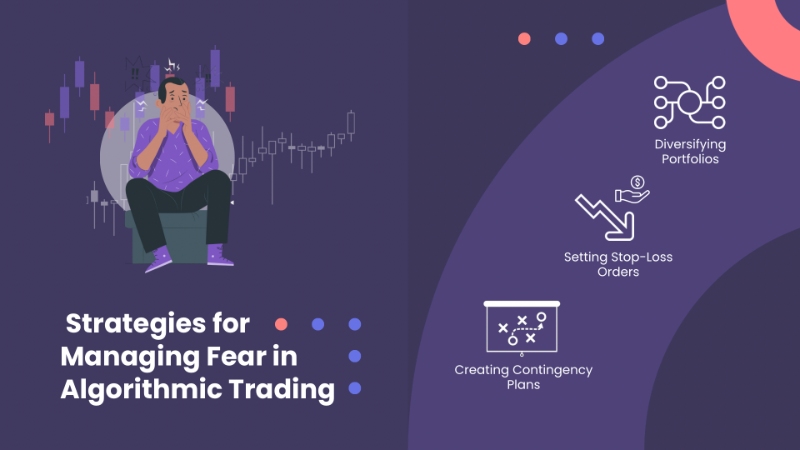Contents
Be fearful when others are greedy and greedy when others are fearful!
That’s a quote from Warren Buffett, the chairman and CEO of Berkshire Hathaway who is widely regarded as the most successful investor of all time. Buffett’s comment points the way to a constant but usually overlooked influencer in trading decisions - psychology! The paradox is that psychology plays an equally important role in the method of investment that was supposed to be most immune to human whims and fancies: algorithmic trading.
It doesn’t matter how experienced or consistent a trader you are, because you are still prone to some degree of emotional and cognitive biases. Depending on the situation, these biases can creep into both systematic and algorithmic trading strategies and lead us to make critical trading mistakes. It is necessary, therefore, to deal with emotions like fear and greed effectively in any efficient trading environment.
Fortunately, there are mitigation strategies we as traders can adopt to counter emotional biases. In this article, we’ll explore how fear and greed affect trading mindsets and how you can manage them effectively.
Impact of Fear And Greed on Algorithmic Trading Performance
Fear and greed are primal emotions that have been drilled into our psyche over millions of years of evolution. They can and do impact almost every aspect of our lives, and are of special significance in the high-risk, high-reward game that is trading.
Fear can cause traders to hesitate, pull out of positions prematurely, and avoid taking risks even when data and analysis suggest otherwise. This can result in missed opportunities and lower returns. On the other hand, greed can lead traders to take excessive risks, make overly aggressive trades, and prioritize short-term gains over long-term success. This can result in avoidable losses and impaired overall performance.
Let’s understand the impact of fear and greed on trading strategies with some real-world examples.
When Facebook’s IPO was first launched in 2012, it was expected to produce stellar results within the first few hours of going live. However, the stock quickly dropped after the IPO, causing many investors to balk and sell off their holdings. The bear run continued with further declines in the stock price before recovering, leading to significant losses for those who sold out of fear. A section of investors had pre-set expectations with the IPO that led to large-scale panic selling. This robbed them of the eventual profits they would have seen once the stock price rose beyond expected benchmarks in a matter of weeks.
Similarly, during the dot-com bubble of the late 1990s and early 2000s, the stock prices of many internet-based companies surged due to hype and excitement around their potential. Investors were eager to cash in on what they thought was the future of technological growth, leading to a frenzy of greed-driven buying. This allowed even unprofitable companies to go public and see their stock prices rise rapidly.
However, this greed-fueled euphoria eventually led to a market crash, as investors realized many of these companies were not as financially sustainable as they had been made out to be. This event demonstrates the risks inherent in allowing greed to drive investment decisions, as it can lead investors to overlook fundamental flaws in a company's business model or financials.

Strategies for Managing Fear in Algorithmic Trading
While you can’t rid yourself of fear entirely, there are ways and means of managing its effect on algo trading practices. Here are some actionable strategies to help you prevent fear from interfering with trading decisions:
Setting Stop-Loss Orders
Stop-loss orders allow traders to set a specific price below which their holdings will be automatically sold. This can help prevent losses from accumulating beyond a point and give traders the satisfaction of knowing they have a plan to limit their downside risks.
Stop-loss orders are particularly useful in fast-moving markets where prices can fluctuate rapidly and unpredictably, leading to significant losses if traders don’t act quickly. Setting up a stop-loss order enables traders to take a more hands-off approach in monitoring markets. This allows them to focus on other aspects of their trading strategy without constantly worrying about risks.
Diversifying Portfolios
Diversifying portfolios is another fear-management strategy that has been proven effective in algorithmic trading. Spreading investments across multiple assets and asset classes helps traders reduce exposure to particular assets and sectors. It also helps bring down overall risks associated with market volatility or economic uncertainty.
Let's say a trader has invested a significant portion of their portfolio in technology stocks. If there is a sudden downturn in the tech sector, the trader could potentially experience significant losses. However, if the trader has also invested in other sectors, such as healthcare or energy, the impact of the downturn in the tech sector will be lessened as the trader's portfolio is diversified across multiple sectors.
Creating Contingency Plans
Contingency plans help traders feel more in control of their investments and reduce fear and anxiety associated with unexpected events.
For instance, a contingency plan could involve setting up specific response plans for different market scenarios. Start by identifying specific market conditions that could trigger a sell-off or other negative outcomes. Then, develop plans to respond to each of these scenarios. That could involve setting stop-loss orders, hedging against specific risks, or rebalancing your portfolio to reduce exposure to certain assets.
Contingency plans also help traders avoid impulsive or emotional decisions when market conditions are volatile. A pre-set contingency plan helps traders focus on executing their strategy rather than being overwhelmed by fear or uncertainty.
Strategies for Managing Greed In Algorithmic Trading
Greed is a prime motivator and can be that much harder to control in algorithmic trading scenarios. Whether you are a professional trader or an armchair investor, here are three strategies to help you manage greed better.
Sticking to a Trading Plan
Having a well-defined trading plan in place allows traders to focus on executing their strategy pointedly rather than being driven off-course by greed.
A trading plan should outline specific goals, risk management strategies, and guidelines for buying and selling assets. Following this plan consistently will enable traders to avoid taking on excessive risk or making hasty decisions based on short-term market movements.
Setting Realistic Expectations
Greed often leads traders to set impossible goals or expect unrealistic gains. Beyond the disappointment and frustration such an approach is likely to cause, it can also lead to a chain reaction of irrational decisions to make up for perceived losses.
Setting realistic expectations helps traders manage their greed effectively and avoid falling into the trap of chasing fantastic profits. Realistic expectations are based on understanding the market and its behavior and considering the risks and uncertainties inherent in any trading strategy. Traders who set realistic expectations are more likely to be patient and disciplined in their approach, avoiding the temptation to make rash decisions based on emotion.
Avoiding Overconfidence
Confidence is a good marker of trading success, overconfidence is not!
Overconfidence can lead traders to take on more risk than they should and make impulsive decisions based on wishful thinking rather than on obvious market indications. Avoiding overconfidence by judging decisions objectively and being open to contrary opinions can be hugely effective in overcoming greed.
Avoiding overconfidence empowers traders to remain disciplined and avoid overconfidence. One way to do that is by constantly reviewing and analyzing your trading performance in terms of profits and losses. This will help you identify areas where you may be taking on too much risk or where they may be underperforming due to overlooked information.
Another way to avoid overconfidence is by remaining humble and open to feedback. Traders who acknowledge that there is always something more to learn are likely to remain sharp and focused on improving trading skills and strategies rather than becoming complacent.
Managing Greed and Fear Better With Tradetron
At Tradetron, we believe in empowering investors to make better and well-rounded algo trading decisions. Our state-of-the-art platform allows investors to craft their custom strategies or subscribe to tried-and-tested ones to ensure their portfolios are backed up by solid data-backed algorithms. You can also run back and live tests on the platform to check their strategies for any biases or discrepancies and eliminate them in due time.
Visit us to learn more about how we empower algorithmic traders.



 Made with Superblog
Made with Superblog